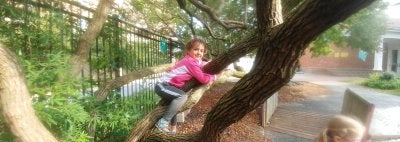

Center for Young Children (CYC)
Green Pages
Please use the tabs below to learn more about how the CYC engages children and staff in environmental learning and action. These also double as part of the application process for Maryland Green Schools and Eco-School USA Green Flag Award

Documentation to earn these awards can be found on this page through the tabs on this page.
Members of the Green Committee -
Student The Blue Room Kindergarten Class, Yellow, Green, and Orange Room Preschool Classes
Teachers- All Teachers at the CYC
Administrator- Dr. Mona Leigh Guha, Leslie Oppenheimer, Anne Daniel, Jennifer Haslip,
Parents- CYC PTP and Hannah Walsh, Laura J. Dugan, Margaret Bereano, Marjan Alaghmand
Community Partner UMD Students- Kira Maginnis, Megan Smith, Christina Higgins,
Facility Personnel Greg Thompson Asst Dir. VPSA-DS-Maintenance, Office of Sustainability UMD
Green Leader Anacostia Watershed Society - Ariel Trahan
2018 -2019 Previous Green School Webpage
2012 - 2017 Previous Maryland Green School webpage

2019 Application Cover Sheet for Maryland Green School Award
through the Maryland Association for Environmental and Outdoor Education
Summary
The Center for Young Children (CYC) as an academic unit in the College of Education, is a full day lab preschool and kindergarten program for children ages 3 – 6 whose parents are primarily students, staff or faculty located at the University of Maryland, College Park campus. From our demographic profile, CYC has an international student body representing over 25 different countries. For current children and families we wish to pass on our goals, ideas, and methods supporting sustainability to future generations.
It is the policy of the classrooms at the CYC to have two outside play times every day if the weather permits. Each playtime lasts around an hour. Children go out to explore, rain, snow or shine.
Playing outside in the fresh air gives children an opportunity to run, move and enjoy the gardens and environment. Nature has so much to offer. Children observe plants and wildlife in a naturalistic setting. Parents are asked to provide necessary clothing appropriate for the weather.
Our curriculum is based on project work where children do in-depth studies of a topic in the "here and now". All domains are covered within the study topic. Throughout the years many of these topics are nature based or environmental in content, such as trees, birds, seeds and recycling. Each study typically runs six to eight weeks.
As is stated In the University of Maryland’s strategic plan, The University wants to take “responsibility for the future” and so does CYC. The University of Maryland strategic plan states,” We will be a campus that is a model for the sustainability of its environment and we will be a university that seeks solutions to the world’s most challenging and vexing problems”. The CYC has been moving forward to become a model “Green” school as members of the University of Maryland community. We work to assess our usage of water, paper, and food disposal, purchase and replace wasteful equipment and strive to behave in an Eco-friendly way. For the Center for Young Children one of our goals is to have the youngest “Terps” attend a green school and develop lifelong conservation behaviors.
Top Five Accomplishments

An audit is conducted with the children helping check for things like drafts around the windows, cracks in the foundation, and weighing trash, compost, and recyclables.
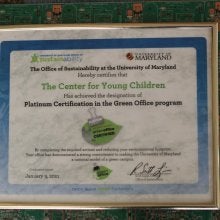
January 2019- The CYC became the first office on campus to earn the Platinum level Green Office Award.
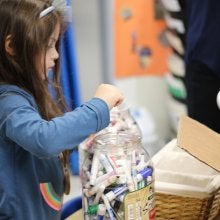
2019 - The Kindergarten class collected all the markers and then estimated how many there were. The final count before sending them to ColorCycle was 266!
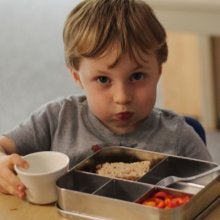
The CYC has had a long going tradition of Trash Free Tuesday and the children weigh and graph the landfill trash made each week. Even when policy changed due to Covid and families were required to bring disposable lunchs, parents conserted to come up with compostable products to put their child's lunch in. They did this through a FaceBook parent group.
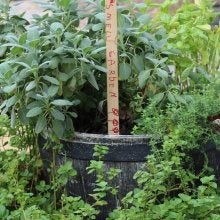
In addition to a vegetable garden each classroom has a garden outside of their backdoor.
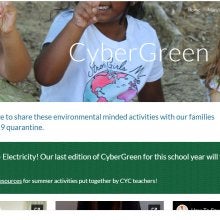
6- Continuing our green initiative during the covid-19 quarantine with weekly CyberGreen activities for families.

Curriculum and Instruction, Professional Development, Sustainable Schools, and Celebration
1.1 Curriculum and Instruction: Environmental Issue Instruction
The CYC has six classroom that correspond with the colors of the rainbow (Red, Orange, Yellow, etc) The Blue Room is the only kindergarten room all others are preschool rooms ages 3 - 4. The curriculum is based on project work where children spend at least two months on a a worthwhile topic. Below you will see examples of environmental education from each of the six classrooms.
__________________________________
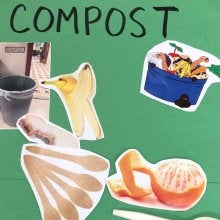
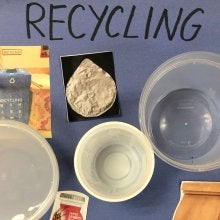
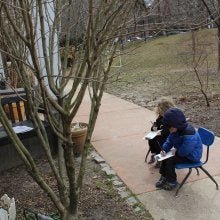
Y
Eric also gifted UMD honey to many of the teachers. This is also an excellent example of parent involvement. More Images
More Images
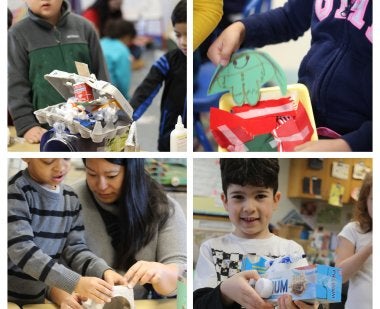
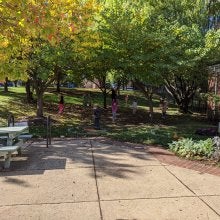
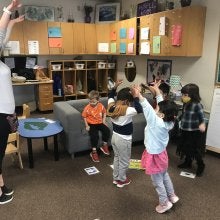
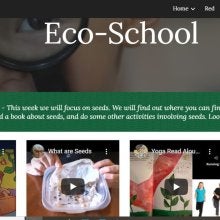
During the Covid-19 school closings, the CYC continued to instruct children in environmental studies. The CyberCYC website had a special Eco-School page to offer lessons and activities in a variety of areas particularly nature oriented. Family participation was encouraged.
1.2 Professional Development
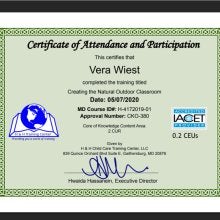
Environmental Education PD - Danielle Miller, Vera Wiest, Mona Leigh Guha, Sara Person, Laura Damron, Bernadette DalyAdventure Play, Water Conservation, Green Cleaning, more certificates.
1.3 Sustainable Schools
1.3.1 School-Wide Environmental Behavior Changes
The staff at the CYC have committed to be environmentally friendly. They have earned the highest award in the University of Maryland's Green Office program. To do this they go out of their way to have waste free meetings and events, they compost and even take plastic bags back to the store to be recycled. Staff carpools when appropriate and offers a salad bar Monday on the first Monday of every month. Teachers use both sides of the paper and turn off electronics when they are not in the room. More actions can be viewed on the Green Office website.
1.3.2 Systemic Partnership
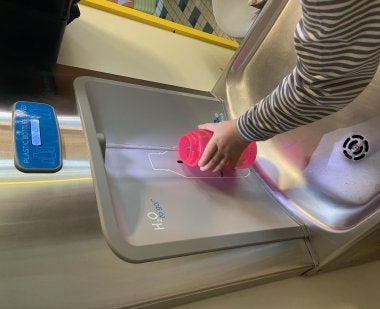
Within the University of Maryland we work closely with the Office of Sustainability. We participate with their Green Office program and they offer advice and resources to us. They also installed a water bottle filling station. See email invitation to join our Green Committee.
CYC PTP - The Parent Teacher Partnership is also very involved in our Green endeavors. They have bought Ranger Rick for the classrooms in response to families bringing their own reusable dishes to the annual picnic. The PTP also works to eliminate waste at meetings by using compostable plates, napkins, cups, etc.
1.4 Celebration
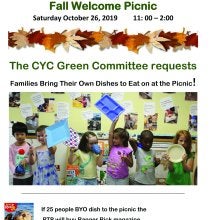
Global Handwashing Day - October 2019- SPH Scholars came to teach children the impotance of hand washing. They also checked before and after children washed with a special soap and light that showed the germs. Children learned a song to go along with the activity. See the video of the college students teaching the handwashing song. This is the 5th time the Scholars have done this.
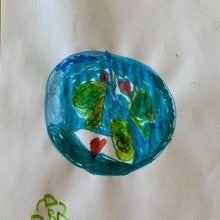
Due to Covid-19, Earth day became virtually. The kindergarten Green Committee made journal entries to answer the question, "How do you take care of the Earth? You can see a slide show of their entries at the bottom of Week 5 and 6 of Green CYC.
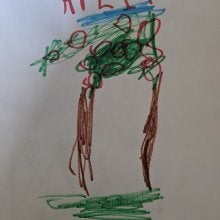
Children teamed up with the Umd Arboretum and submitted drawings of trees that were placed as a slideshow on Facebook. This also became an extension of the Orange Room's Tree Study. See the pictures.
Denton Green Fest 2019- This is an annual event the CYC has participated in for the past five years. See objective 3, The School is active in the community, for more information.
Maryland Day 2019- This is an annual event the CYC participates in each year. See objective 3, The School is active in the community, for more information.

2.1. Water Conservation/Pollution Prevention
The CYC has a rain barrel that the children use to water gardens and anything else that is green on the playgroud. This along with some watering cans are available to the students anytime they play on the playground.
The CYC has a rain garden with many native plants that attract insects and other wildlife. The rain garden also keeps portions of the playground from flooding. The children help maintain it by building a fence in the spring to keep people from walking on the newly emerging plants. They also water the garden when needed
2.2. Energy Conservation
Mostly on Tuesdays, 50% of the classrooms turn off their lights during lunch not only does it save energy but it has a calming effect on the classroom.
B -Turn Off the Lights - Kindergarten class November 2020
2.3. Solid Waste Reduction

Before Covid-19, children at the CYC have been collecting used markers to send off to Crayola for recycling. The last time the school did this, in February 2020, the kindergarten class collected the markers from each room and counted them. There were 266! Unfortunately the markers sit boxed and ready to mail due to Color Cycle not accepting any markers until after the pandemic. Children decorate recycled boxes for each class to use for collecting the used markers.
May 20, 2019 – The CYC Little Free Libraries got a face lift. The CYC is fortunate enough to have not one, but two Little Free Libraries. Little Free Libraries is an international non-profit organization that encourages members of a community to put up a small structure to house used books for anyone passing by to take one and then in return leave one.
Greg Thompson, from dining services had two built for the CYC in May of 2014. Representatives from the CYC Parent Teacher Partnership monitor and steward the two libraries, making sure the libraries are neat and has an ample supply of books. One Little Library is filled with childrens books, the other is for adults. Last year’s steward Priya Varadan, painted the libraries white with a red roof; a clean pallet for the children to decorate. This year’s steward Jackie Madoo, completed the job with the children of the Purple room adding their handprints as flowers. The nature theme has delighted children and parents alike, who frequent the libraries as during drop off and pick up. One brother of a CYC student commented that he really liked it and once found a water powered calculator kit in there.
2.7. Habitat Restoration
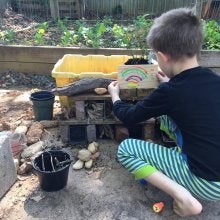
Lessons were taught about habitats durin covid lockdown with this video of a girl and her mom making a bug hotel. This inspired some children to try their hand at making bug hotels as they learned the importance of helping benificial insects find shelter during colder times.
B - Schoolyard Habitat Award from the NWF - All classes, Everyday
The CYC maintains and is a certified Schoolyard Habitat for providing food, shelter, and places for animals to raise their young. In this video we talk about how the shool does this with the help of the children and it also questions the children to do the same at home. See more on habitat instruction. The Orange Room manages bird feeders by filling them up and observing the animals.
Transportation -

3.1. School Active in Community -
The CYC signed up to participate in the 2020 Denton Greenfest but it was cancled due to the virus.
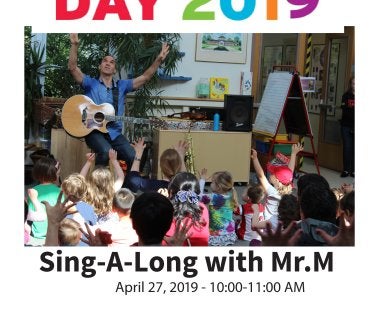
Unfortunately, Maryland Day 2020 was cancled due to the virus, otherwise the CYC would have participated as it has in the past.
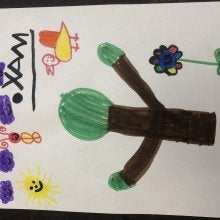
Healthy living was a topic for the week of May 26th 2020, where GreenCYC children and teachers shared healthy eating ideas and exercise images on their wheeled vehicles.
Community Active in the School -
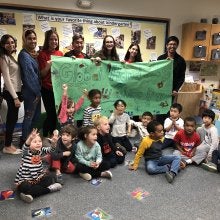
Director of Global Health Engagement Dr. Elisabeth Maring has brought undergraduate students to the Center for Young Children for about six years. The effort demonstrates the School of Public Health's commitment to community outreach and education.
PTP Picnic -
3.2. Awards and Special Recognition
Maryland Green School Award, Eco-School USA Green Flag, UMD Platinum Green Office Award, Schoolyard Habitat NWF Award

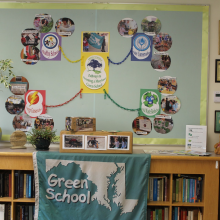


Fourth and final renewal application for Eco-School USA Green Flag Award

In Progress - Hope to complete by June 2021
Step 1: Form an Eco-Action Team
Please see the cover page that lists, teachers, administrators, parents, classrooms, and others that are active members of the Center for Young Children Green Committee. The Green Committee gets monthly updates in the form a an e-meeting email, at PTP meetings, Staff Meetings, and during Kindergarten class meeting.
Step 2: Conduct an Environmental Audit
We conducted three audits for the Green Flag.
Step 3: Create an Eco-Action Plans see below -
- Energy Conservation - Turn off the lights campaign
- Schoolyard Habitat - Bird feeders
- Consumption and Waste - Trash Free Tuesday
Step 4: Monitor and Evaluate Progress - (Post images of actions and evaluations)
Fall 2020 - Turn Off the Lights Campaign - The Kindergarten class decided to make signs to remind people to turn off the lights when they don't need them so as to not waste electric energy. They made signs for each of the other classrooms and some to take home. They also kept track of when they turned the classroom lights off.
Fall 2020 - Bird Feeders - The Orange Room decided to attract more birds outside of their window by making bird feeders. They counted how many birds came to the window without the feeders and how many came afterwards.
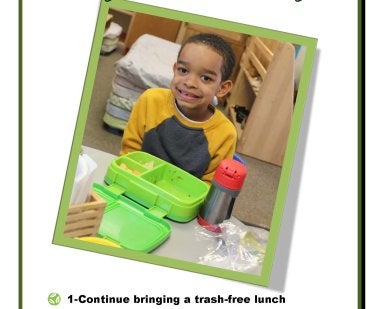
Pieces of trash are collected from each classroom. Kindergarten children count the pieces and graph them on a chart for the school to see. The whole school participates including staff. All of the classrooms also compost to help eliminate landfill trash.
Families saw the rate of landfill trash go from around 30 pieces to 12. In the past the children weighed the trash but counting seemed more developmentaly appropriate for this age to understand.
Step 5: Link to Existing Curriculum - Please see Objective 2 in the Maryland Green School application to view how each of our six classrooms named after the colors of the rainbow, learn and become involved in the environment through lessons provided by their teachers.
Step 6: Involve the Community
1 -The school uses a prominent, designated way such as a newsletter, bulletin board or website, to communicate Eco-Schools USA activities with staff and students along with the greater community - CYC uses this website, Facebook, and emails to communicate activities.
2- The whole school, along with community volunteers, engage in a number of EcoSchools USA activities - PTP picnic, Global Handwashing Day, See Objective 3 for images and more detail.
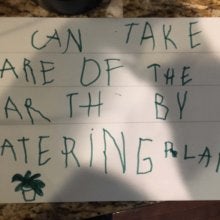
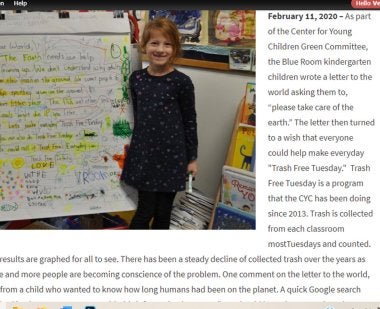
5- The school uses the Eco-Schools USA website and other communication tools to share its projects with other schools in US and with the global community - We use FaceBook, this website, and the EcoSchools website to communicate with others.
Step 7: Create Your Eco-Code